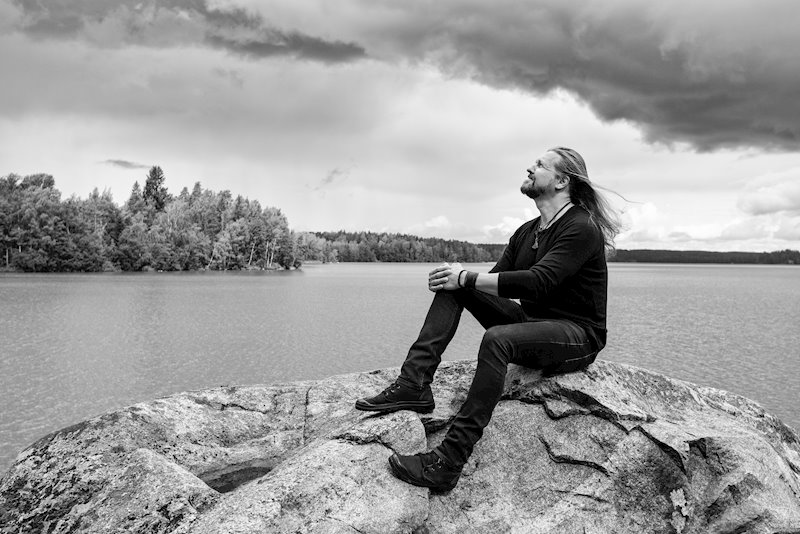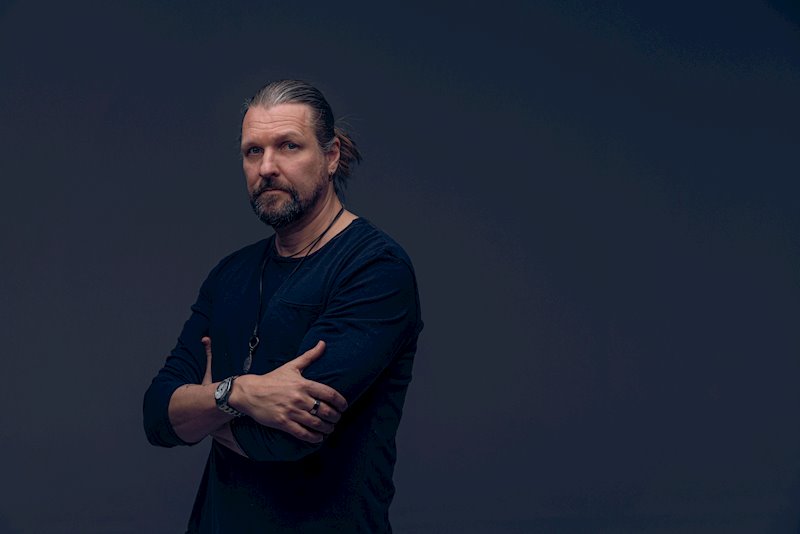This year has been pretty interesting – even though most musicians were left without jobs, some of them saw an opportunity in all this sudden extra time at hand. Finnish guitarist Esa Holopainen (AMORPHIS) is certainly one of them. A small pandemic hasn’t kept him from working on music, with the result being his first solo effort, SILVER LAKE. The self-titled debut record is going to be released through Nuclear Blast Tonträger. Before heading off to Sweden for the recordings of AMORPHIS‘ new album, we had the opportunity to chat with the guitarist about his solo effort. Read the complete interview here…

First of all, thank you so much for taking the time to do this interview. I know that you are pretty busy right now, so I really appreciate it. How are you doing?
I’m doing really fine, thank you, but a bit busy. I’m just about to go to Sweden this week to finish the guitar recordings for the next AMORPHIS album. It’s a little bit of a hassle, but otherwise okay [laughs]. I tried to finish all the interviews for the SILVER LAKE release before [going to Sweden].
Sounds good! Well, I kind of have to ask for the AMORPHIS fans… so I’m just going to do that before we’re going to talk more about SILVER LAKE obviously. How has everything been with the preparations for the new AMORPHIS album?
It’s been really good. A bit slow this time because of the pandemic and the restrictions. So far we’ve recorded everything in Finland: all the drums, rhythm guitars, and bass. Now we continue in Sweden with the rest of the guitars and with the vocals. So it’s been really good. Really good! Jens Bögren is producing it again and I’m pretty sure the result will sound quite big [laughs].
Great, I’m looking forward to that. Anyway, let’s focus now on different things. It seems like you’ve been talking to many medias about SILVER LAKE and your upcoming album. Has it been exciting for you to discover what the press thinks about your first solo album and what everyone, you know, thinks about it in general?
Yeah, it’s been [exciting]. I really didn’t have any expectations when it comes to the release. I knew that it’s going to be a slightly different musical world and people are used to hearing from me mainly from AMORPHIS, but yeah, I’m being really curious to see in what way people will react and how they are going to like it and if they would like the result. Making the album was great fun for me because it was like a musical playground for me to try different styles with different singers.
You’ve only been ever involved with AMORPHIS, so the style of that band is pretty much set, but was it fun for you to be able to experiment more and maybe discover some new things about yourself in the process?
Absolutely! It’s a bit funny, but I think mostly what I enjoyed while working with the songs was that I didn’t have to record those harsh guitars and there were more dynamics with different instruments. That was one thing that I really enjoyed, because I have always been used to the sessions where I just have to play guitar from the beginning until the end, the whole album, and that’s it from my part. Now, I really got a chance to be involved with everything that’s going on. I guess the vocal arrangements, coming up with vocal melody lines with Nino [Laurenne, Sonic Pump Studios], all those things were definitely new territory for me, but I really enjoyed it. At the same time, I realized that it’s actually pretty hard work with a vocalist, when they work with their own lines and own arrangements. It’s not an easy task.
Now that you’re now that you mentioned Nino Laurenne [producer], I might as well ask my next question! The story goes that Nino, one day during the lockdown, gave you a call to ask you whether it’s time to start working on your solo album. Now, I know that AMORPHIS has worked with Nino in the past so obviously you guys know each other very well. I was wondering, however, when the idea came to do a collaboration like this?
It’s been more or less a bar discussion, I guess [laughs]. After a couple beers, we always started to talk about how, “it would be nice to work together and if I ever do a solo album, I would like to do it with you,” and a lot of hugs [laughs]. A true men’s moment [laughs]. I think that’s when we have sort of decided that it would be nice to do something together someday. Now that, with the lockdown, all our shows and tours got canceled, he kind of remembered that and gave me a call and asked whether I’m interested because he wasn’t that busy either at that time. So he asked me whether I’d be interested to start to work with my solo album because now I really have some time and, more importantly, no excuses [laughs]. So that was the starting point for me, but it was a good idea. Otherwise, I don’t know what I would have done with my time last year, probably play PlayStation or watch Netflix or something like that [laughs].
So was working on your solo album, in a way, some kind of project to keep you occupied maybe from having nothing to do?
Probably! You know, when I started to work on the first songs, I really wasn’t sure what the project is going to be like and I definitely didn’t have any idea that it was going to be the project that it ended up to be. I guess that after the first songs and when I saw how excited Nino was about the tracks that I played to him, I really got more self confidence to start to write more music… and partially because of the music itself, because it varied a lot and was really diverse. I decided that probably it’s a good idea to ask several of singers to sing those songs because musically, they are very different from each other. In a way it was a good plan, because that also guided me or opened my eyes to the bigger picture of this project [so I could] ask for friends to join and sing on this album.

Now obviously, you’ve worked with Nino in the past, but do you think it’s been different working on the solo album than while working together for AMORPHIS?
Absolutely! When we worked together on those AMORPHIS albums, Nino was pretty much the recording engineer. Of course, he gave ideas but he wasn’t as productive as he was with the SILVER LAKE album. We did the song for Tuska‘s 20th anniversary together. This was a song that included a lot of different guitar players and vocalists and I wrote that song and Nino produced it. So that was like the first time we really collaborated together closely. Our chemistry really clicked well together. It was really easy to work with him.
In some other interviews, you already mentioned that it was important for you to have a project name rather than to slap your own name on the cover art, partly because of the many guests. This made me wonder whether the guests you asked had any kind of freedom on this album or did you write everything from the first to the last note?
That’s really depended on the singer and the song. There are a couple of singers that wanted to do everything, including lyrics, vocal arrangements, and melody lines and I absolutely trusted these guys in doing so 100%. Because I knew that if you give these guys a free hand or artistic freedom, they probably come up with the best possible results. For some singers, I did the vocal arrangements and vocal melodies with Nino. So it really depended on the singers and that was one of the great things to realize during this process, how differently different vocalists work.
You obviously don’t write a lot of lyrics for AMORPHIS; how was the experience of getting into that process? I guess it’s very different from writing music?
I’ve written some lyrics for AMORPHIS when we started the band [laughs] and I don’t really consider that experience as writing lyrics. So it was a [new] area, something unknown for me. I think that writing the lyrics was not probably the biggest challenge for me. I think the biggest challenge was to arrange the lyrics and try to find the synonyms and the right singing words because sometimes you have to replace some words. I dealt with topics from mental health issues to nature and everything in between. Something that this album doesn’t have is a lyrical concept or theme, obviously, because there are several lyricists on this album, but I’m really happy about the result because the lyrics are very universal, so it’s pretty easy to listen to them. You don’t have to have a dictionary to really understand what lyrics are about. Well, except the Finnish song, maybe [laughs]. Of course [laughs]. Nobody understands anything in that one.
I was actually planning to ask you about that one. We have a more international audience and I bet some people have no clue who Vesa-Matti Loiri is. Could you explain briefly who he is, how he got involved, and if you feel like explaining what he’s saying that would be very welcome too [laughs]?
Vesa-Matti Loiri is the most famous Finnish actor. He’s the guy that everybody knows of here. He’s now around 77 years old. He’s done a long career as an actor and as a performing artist. I think he recorded his first albums during the ’60s and at the same time, he started to act in movies. So, he’s a great star. These days he doesn’t do that much anymore. He’s really selective about what he does, even what comes to interviews and everything. A friend of mine, with whom I started my first bands back in the days when we were young, is a film producer. He also manages Finnish actors. Vesa-Matti Loiri is one of his clients so that’s how I got in contact with him. He played the song to him and he liked the song and the text and that’s pretty much how I got him involved in this project. The text is in an old poem, from a form of old Finnish poet called Eino Leino. He doesn’t live anymore and the poem was written in, I think, 1878. It tells the world’s creation story according to old Finnish mythology, how the world was created from little islands, and so on. So this was something that Vesa-Matti also felt really connected to because he’s done some recordings from Eino Leino‘s poems before, and he really felt a good connection for this one. So yeah, that’s the story behind “Alkusointu.”
Are there any lyrics that you wrote that you’re particularly proud of?
Probably the lyrics for “Storm,” which was the first single. It’s basically a home-longing story about understanding where your roots are, where you’re coming from, and the feelings that you usually get when you go abroad. It really got another dimension because the singer Håkan Hamlin, a Swedish singer, who flew to the Canary Islands to shoot the video for “Storm” with the director, Uwe Lingvall, and he fell so in love with the place that he never went back to Sweden. He is now living in the Canary Islands [laughs]. It’s unbelievable when you see him in the video and singing those lyrics and that for me totally gave me a new perspective.
Do you feel like the pandemic also provided you more perspective on the matter? Considering you’re always on the road with AMORPHIS and having been home so much, it must have given you new things to think about?
In a way, yes, because it’s usually… if you come home from a tour, you enjoy life for a couple of days and then you start to see all the things that start to annoy you about Finland or wherever you live. You really understand all the good points when you travel or when you’re away for a longer period of time. That is the time when you really start to miss the little details. Even details that in normal life I wouldn’t pay much attention to, and that is something that is always good to remember whenever you feel like you want to move to another country or somewhere else [laughs].
Obviously, a couple of vocalists who are featured on this record were not a big surprise to me; for example, Anneke Van Giersbergen or Tomi Joutsen. In some other interviews, you mentioned that you’ve chosen singers that you respect and your friends mainly, but were there any other collaborations on the table that maybe didn’t happen? Or are there people you still would want to work with in the future?
Actually, yes. There was Amalie Bruun from MYRKUR. We asked her to if she would be interested to join this project. I didn’t have a song for her yet and I would have written it but she was in the middle of doing her own music project for MYRKUR, or something else. I don’t remember what she was doing. She was really happy that we asked her and I would definitely like her to join me one day. If I ever do another album, in the future, it would be nice to have her there. Other than that, everybody that I asked for this, is here on this album.
A lot of the singers you asked are actually bands you have shared the stage with during tours. For instance, you had a show with LEPROUS and SOILWORK at the Ice Hall a while ago now. Was their performance that day of importance in making the decision of asking them to join as a guest?
No, not really. You know, we’ve played with many bands and I’ve met many great musicians and vocalists. These people who are on the album, I consider them foremost as my good friends and their music has somehow touched me. They are people that I really, really wanted to work with. So in that perspective, I pretty much decided who I would like to have for the songs. Of course, you know, when my first three songs were almost finished – before I had anything else – I had to start thinking about what kind of elements these songs should include and who I know and who would be a good singer for them. So there were a lot of little details for me.
Now, some songwriters, like Arjen Lucassen of AYREON, know pretty well how to write songs for other people and they kind of see the potential in vocalists that they perhaps didn’t even realize they had. I actually think that with this album, you also managed to do that and you really captured the essence of these people in each song; was that an easy process for you?
I wouldn’t say that it was easy but of course, I had to take care that when I was writing the songs or checking the arrangements that it’s written in the right key for these singers. Then, I wanted to have some little details and nuances where I think these singers are at their best. If I listen, for example, to KATATONIA songs I really love, how their acoustic approach to their music sounds, and I think that Jonas‘ voice is perfect for more acoustic and melancholic… [laughs]. Well, naturally melancholic… [laughs]. That’s what he does with KATATONIA, but with a more acoustic approach and perhaps a different focus, so those were like little details that I was thinking of. With “Ray of Light,” featuring Einar Solberg [LEPROUS], I thought that Einar was the only vocalist that I was I could imagine doing “Ray of Light.” That song also had a lot of elements that really fit the vocal range of Einar‘s style and how he sings.

Yeah, now obviously you’re mainly a guitarist but did you ever wonder if you maybe should sing these songs yourself?
[laughs] Well, yeah, I think that you know, take the first song – the instrumental song – that was my way of singing a song as an instrumental and with a guitar and that’s why I needed to do it. You know, I don’t want to be that much in front because the music that I enjoy listening to myself does not really include that many shredding guitars or anything. My idea was more to serve the songs through my playing. But there were some cases during the recording process where Nino had to really remind me that, hey come on, this is going to be your solo album and you’re a guitar player from a metal band [laughs]. Please record some more guitars! But as I said earlier, you know, I really enjoyed the fact that I really had a sort of artistic freedom as a guitar player and if I felt that the arrangement doesn’t need that many guitars or doesn’t need distorted guitars, I definitely didn’t want to add them there on purpose.
In my opinion, in this project, the guitars are there mostly to provide more atmosphere and I got the impression that you also paid a lot of attention to how the guitar should sound on this record, which perhaps not too many people notice because it’s a bit more in the background.
Absolutely. One of the reasons was because the typical metal rhythm guitar sound is very dominating. If you have a lot of things going on, you have to compromise, then, you know, you can’t add distorted rhythm guitar and at the same time, you can’t have the little nuances or details from strings, keyboards, or with vocals, the frequencies are sort of eating each other, which is never a good thing. Yeah, so I think you pretty much said it very well. That was my idea as well, to with my guitar feel the overall feeling and feel the emotions and that’s what I tried to achieve with the songs.
How do you see the future of this project? Obviously, you’re very busy with AMORPHIS, mostly with touring. Is SILVER LAKE something that you’d like to work on more in the future? Would you ever consider taking this to this stage?
If it’s possible, it would be nice to do at least one or two shows. It will be really tricky to have all the vocalists at the same time at the same place, especially now, when and if we get rid of the coronavirus and bands start to tour again. I think every single musician and vocalist on this album is going to be really busy with their own bands. Another album, absolutely! When I have some time. I will probably start to focus on writing songs little by little. However, I don’t think I’m going to have this much extra time in the future, but who knows. Let’s start to write little by little and we’ll see from there. Definitely at some point, though, I will do another album because it was such a good experience.
Glad to hear this is not the end of SILVER LAKE. Anyway, that’s it for my question, so I’ll let you get off to Sweden [laughs]! Do you have any last thoughts you want to share with people who will read this interview?
Well, the album, it’s coming out next week. Hopefully, people get into it and they have a chance to hear another side of me as well! Thanks for this interview, it was nice!




